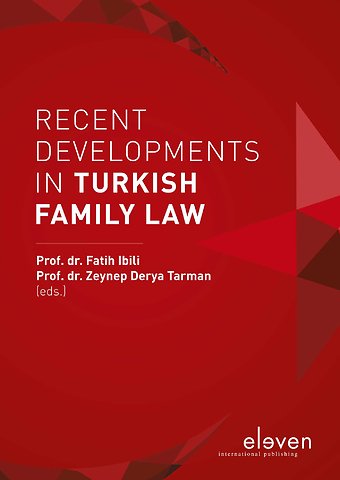
Recent Developments in Turkish Family Law
E-book Pdf met watermerkbeveiliging Engels 2020 1e druk 9789089742377Samenvatting
This book gives an overview of recent developments in Turkish family law for legal practitioners in Europa.
In this regard, both the private international law and the substantive law aspects of Turkish family law is explained, with a special focus on the recognition and enforcement of foreign divorce decisions (Prof. dr. Zeynep Derya Tarman), the role of fault in divorce proceedings (Dr. Özgün Çelebi), the dissolution of the matrimonial regime of participation in the acquisition (Dr. Hanswerner Odendahl), the surname of women and children (Dr. Yasin Alperen Karaşahin) and joint custody after divorce (Dr. Işık Önay). It contains up to date information based on recent amendments in legislation and recent case law of the Court of Cassation (Yargıtay) and the Constitutional Court (Anayasa Mahkemesi).
This book contributes to a better understanding and application of Turkish family law in European legal practice.
Trefwoorden
Specificaties
Lezersrecensies
Inhoudsopgave
RECOGNITION AND ENFORCEMENT OF FOREIGN DIVORCE DECISIONS IN TURKEY 11
Prof. Dr. Zeynep Derya Tarman
1 Introduction 11
2 Legal sources regulating recognition and enforcement in Turkey 12
3 International conventions 12
4 Recognition and enforcement under the PIL Code 15
4.1 The distinction between recognition and enforcement under Turkish law 15
4.2 Prerequisites for recognition and enforcement (Art. 50 of the PIL Code) 15
4.2.1 The foreign decision shall be pertaining to a civil or commercial matter 16
4.2.2 The decision shall be rendered by a state court 16
4.2.3 The decision must be final 16
4.3 Conditions of recognition and enforcement 17
4.3.1 Reciprocity 18
4.3.2 Exclusive jurisdiction 19
4.3.3 Exorbitant jurisdiction 19
4.3.4 Public policy 20
4.3.5 Procedural rights of the defendant 25
4.4 Procedure for recognition and enforcement before Turkish courts 26
4.4.1 Local jurisdiction of Turkish courts 26
4.4.2 Legal interest 27
4.4.3 Petition 27
4.4.4 Court fees and expenses 29
4.4.5 The limitation period 30
5 Recognition under Article 27/A of the Law on Civil Registry Services 31
5.1 Conditions for recognition 31
5.2 Procedure for recognition 32
THE ROLE OF FAULT IN DIVORCE PROCEEDINGS IN TURKISH FAMILY LAW 35
Dr. Özgün Çelebi
1 Introduction 35
2 The role of fault in the grounds for divorce 37
3 The role of fault in the material consequences of divorce 44
3.1 Liquidation of the matrimonial regime 44
3.2 Inheritance rights of the surviving spouse 45
3.3 Compensation for material and moral damages 47
3.4 Post-divorce alimony 49
4 Conclusion 50
DISSOLUTION OF THE MATRIMONIAL REGIME OF PARTICIPATION IN THE ACQUISITION IN TURKISH LAW 53
Dr. Hanswerner Odendahl
1 Preliminary remarks 53
2 Introduction 54
2.1 The development of Turkish matrimonial property law 54
2.2 The main features of the regime of participation in the acquisition 55
2.2.1 General 55
2.2.2 Main difference with the German community of gains: the allocation of the cyclical increase or decrease in value 61
2.2.3 The marriage-related contribution 63
2.2.4 The return on personal assets as acquisition 64
3 The adoption of participation in the acquisition in Turkey 64
3.1 By the legislator 64
3.2 Through jurisprudence and jurisdiction 65
3.2.1 Individual dissolution and debts 65
3.2.2 Implementation to resolve the conflict situation between the spouses 68
4 Consequences 69
THE SURNAME OF WOMEN AND CHILDREN IN TURKISH LAW 71
Dr. Yasin Alperen Karaşahin
1 Introduction 71
2 Overview of the relevant sources of law 71
3 The surname of women 73
3.1 The surname of women after marriage 73
3.2 The surname of women after the death of their husband 77
3.3 The surname of women after divorce 78
4 The surname of children 80
4.1 Acquisition of the surname by birth 80
4.2 Change of the surname of children 83
4.2.1 Change of the surname by court order in general 83
4.2.2 Change of the child’s surname by court order after the parents’ divorce 84
4.2.3 Change of the child’s surname by court order in other cases 87
5 Conclusion 88
JOINT CUSTODY AFTER DIVORCE: NO LONGER A TABOO FOR TURKISH COURTS 91
Dr. Işık Önay
1 Introduction 91
2 How do Turkish courts deal with foreign laws allowing joint custody after divorce? 91
2.1 Overuse of the public order exception until 2017 92
2.2 The tipping point: the C.L.B. decision 94
3 Joint custody under Turkish law 97
3.1 Relevant provisions of the Turkish Civil Code 97
3.2 The traditional approach 99
3.3 The liberal approach 100
3.4 Recent case law 101
4 Concluding remarks 102
Anderen die dit e-book kochten, kochten ook
Rubrieken
- advisering
- algemeen management
- coaching en trainen
- communicatie en media
- economie
- financieel management
- inkoop en logistiek
- internet en social media
- it-management / ict
- juridisch
- leiderschap
- marketing
- mens en maatschappij
- non-profit
- ondernemen
- organisatiekunde
- personal finance
- personeelsmanagement
- persoonlijke effectiviteit
- projectmanagement
- psychologie
- reclame en verkoop
- strategisch management
- verandermanagement
- werk en loopbaan







